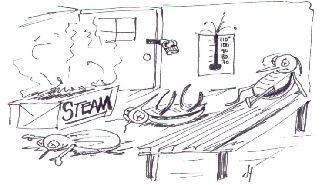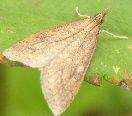Natural Solutions to Things That Bug You (69 page)
Read Natural Solutions to Things That Bug You Online
Authors: Myles Bader

Innocent people may become victims to bed bugs when they see a perfectly good mattress, dresser or couch, grab it up and take it home with them only to cause an infestation in their own homes.
Depending on the extent of the infestation people need to recognize that it is not always necessary to throw out items because they can be treated and replacement cost is very high. Some bed bug specialists are capable of decontaminating an infestation.
If you have infested furniture follow the
National Bed Bug Research Authority
www.nbbra.org
advice in safe and effective treatments.
If you insist on getting rid of the items that are infested, make sure that they are 100% properly contained and wrapped in plastic, taped and boldly marked
CAUTION -
BED BUG INFESTED
before
you move them through your home or out on to your sidewalk or lawn for proper disposal.
If you do call a disposal company to remove infested items let them know that what they are picking up is infested with bed bugs.
What NOT to do:
Think
safety first and foremost
when seeking solutions for bed bug elimination. Mistakes lead to re-contamination and possible damage to you or your home.
DO NOT
use excess amounts of foggers or aerosol type of insecticides. These can cause explosions and fires!
DO NOT
place items in the microwave – Again extremely dangerous!
DO NOT
use a conventional oven – FIRE RISK!
DO NOT
use a hair dryer. This will blow them all over the place!
DO NOT
Send your infested clothing to a dry cleaner! You could spread the infestation to others.
Please act responsibly by identifying items and spreading the word about bed bugs.
THEY LOVE TO BE A STOWAWAY
Used furniture needs to be checked and cleaned thoroughly before placing it in your home. They may also be hiding in a suitcase, pillow or other item that may be carried on a trip or into a hotel room. They can survive for many months without feeding and if you wake them with a move they will become active and go looking for a meal. They can even go from apartment to apartment through small crevices in the walls.
HERE A BITE, THERE A BITE
If you are complaining of a bite, you should suspect bed bugs, especially since they only infest a small area of a house or apartment and usually the bedroom. If you wake up with a bite or two in the morning, you had better start investigating the bed area and take action immediately. They can be anywhere in the bedroom such as the springs, baseboard, mattress, box spring, wicker furniture, behind cove molding or even in the laundry.
SCRUB-A-DUB, DUB
If you do identify a problem, start cleaning immediately. Scrub all infested area that are suspect with a stiff brush to dislodge any eggs and use a vacuum cleaner to clean up the area. Remove drawers and clean inside the tracks, which is one of their hiding places. Dismantle the bed frame to expose any hiding areas. Once you clean the mattress and box spring, enclose them is a special cover to stop the bugs from getting back in. Be sure that the blankets do not touch the floor.
SURVIVING COLD CLIMATES
Prolonged exposure to sub-freezing temperatures is necessary to successfully destroy 100% of bed bugs treated. Professionals report that infested items must remain frozen for several weeks in order to deliver 100% control.
SEARCH & DESTROY
If you think that you have a problem but are not sure, just use a flashlight at night and search the area. You can find out where they are and eliminate their home base.
THEY DON’T LIKE HEAT
 Bed bugs do not like excessive heat. Experts report that 122
Bed bugs do not like excessive heat. Experts report that 122
F for about one minute will kill all life stages of bed bugs. Professionals use steam and heat treatments to kill bed bugs. Steam cleaning a mattress will kill bed bugs on contact.


TREAT THE MATTRESS
One solution is to treat the seams, folds and especially the button areas if your mattress has some.
Special thanks to Paul J. Bello, Entomologist for assistance with the
bed bug information.
For Additional Bed Bug Information:
NBBRA- National Bed Bug Resource Authority
6 Hutton Centre Dr. # 600 Santa Ana, CA 92705
www.nbbra.org
Email to
[email protected]
1-888-9-NOBEDBUGS
BLACKBERRY PSYLLID
General Information:
 This is a jumping pest that will injure cultivated plants, but is usually found on wild blackberries. The adult is yellow-brown and has three yellow bands on each wing. They will lay their eggs on the stems of the leaves and young shoots. The nymphs and adults will puncture the leaves and stems resulting in stunted or distorted growth patterns. Ladybugs like to feast on these bugs.
This is a jumping pest that will injure cultivated plants, but is usually found on wild blackberries. The adult is yellow-brown and has three yellow bands on each wing. They will lay their eggs on the stems of the leaves and young shoots. The nymphs and adults will puncture the leaves and stems resulting in stunted or distorted growth patterns. Ladybugs like to feast on these bugs.
DUST THEM
A good dusting with diatomaceous earth (DE) will eliminate these pests if they do leave the blackberry patch and head for your garden.

CABBAGE ROOT MAGGOT
General Information:
These are legless white maggots that have a black hook on their heads and prefer to feed on cabbage, radish, turnip, broccoli and cauliflower roots.

They will kill a plant if not stopped and are capable of producing two generations every year. Their eggs are laid in the soil and the adult flies hatch in early spring.
WORMS WIN AGAIN
One of the best methods of eradication is to use Nc nematodes when planting in seed furrows or around areas that you are transplanting. You can also use soap and lime spray to stop them from laying eggs.
CELERY LEAFTIER
General Information:
 Found throughout North America this bug will do a lot of damage to vegetables and ornamentals. They are pale green in color and have a white stripe running down their back.
Found throughout North America this bug will do a lot of damage to vegetables and ornamentals. They are pale green in color and have a white stripe running down their back.
Eventually as they mature they will turn yellow.
The worms will eat holes in the leaves and stalks and will fold the leaves together and tie them with their web material. Their eggs look like fish scales and are laid on the underneath side of leaves.
BUG ELIMINATION
There are a number of methods of eliminating these bugs that work well. These include handpicking, using Bt and if the infestation is really bad you will have to use pyrethrum.
